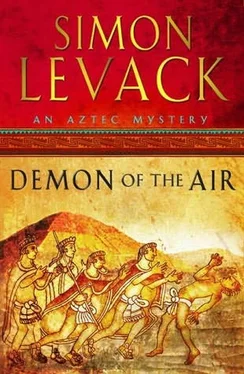Simon Levack - The Demon of the Air
Здесь есть возможность читать онлайн «Simon Levack - The Demon of the Air» весь текст электронной книги совершенно бесплатно (целиком полную версию без сокращений). В некоторых случаях можно слушать аудио, скачать через торрент в формате fb2 и присутствует краткое содержание. Год выпуска: 2012, Издательство: St. Martin, Жанр: Исторический детектив, на английском языке. Описание произведения, (предисловие) а так же отзывы посетителей доступны на портале библиотеки ЛибКат.
- Название:The Demon of the Air
- Автор:
- Издательство:St. Martin
- Жанр:
- Год:2012
- ISBN:нет данных
- Рейтинг книги:4 / 5. Голосов: 1
-
Избранное:Добавить в избранное
- Отзывы:
-
Ваша оценка:
- 80
- 1
- 2
- 3
- 4
- 5
The Demon of the Air: краткое содержание, описание и аннотация
Предлагаем к чтению аннотацию, описание, краткое содержание или предисловие (зависит от того, что написал сам автор книги «The Demon of the Air»). Если вы не нашли необходимую информацию о книге — напишите в комментариях, мы постараемся отыскать её.
The Demon of the Air — читать онлайн бесплатно полную книгу (весь текст) целиком
Ниже представлен текст книги, разбитый по страницам. Система сохранения места последней прочитанной страницы, позволяет с удобством читать онлайн бесплатно книгу «The Demon of the Air», без необходимости каждый раз заново искать на чём Вы остановились. Поставьте закладку, и сможете в любой момент перейти на страницу, на которой закончили чтение.
Интервал:
Закладка:
Had I imagined the way she had looked at me while we were talking about the death of Bathed Slaves? Many women found priests alluring. They found us intriguing and sinister, for our ancient hymns and bloodstained knives, our black robes and long, tangled hair. They thought us brave, because we fasted and bled ourselves and confrontedthe gods every day and the creatures that frequented the darkness every night. And they could not have us, for we were celibate, and that only made us more fascinating.
Lily was a handsome woman, much the same age as myself, and something about her had snagged in my heart and was refusing to be dislodged. Perhaps it had been her fierce pride in what her late husband had done, or her refusal to surrender to grief or rage, or her defiance toward the Chief Minister’s messenger. Perhaps it had been something in that moment we had shared, dwelling on the long-ago death of her father’s slave. She was named for the boldest of flowers and for a moment I thought that if I had just seen its deep red and brilliant yellow petals for the first time, I should not have been so struck by them. I turned the name over on my tongue: “Lily …”
Then I allowed the face in the water an indulgent smile. A man who had sold himself into slavery had no ambition, no desire, no will of his own. He had given all that up, and now just had fantasies, and they were safe enough.
Two faces smiled back at me.
I nearly fell in the canal. Recovering hastily from the fright, I stepped back and looked at the new arrival in the flesh.
He was dressed as a priest. Skulls and stars adorned his long black mantle. An ocelot-skin tobacco pouch dangled on his chest. His hair was as long as mine, although not as dirty as a priest’s hair would often be: matted and filthy with moss growing in it. Fresh blood, drawn from his earlobes, lay congealing on either side of his neck.
For a moment I had the unsettling feeling that I was seeing myself, a dozen years younger, until the surprise wore off and I began to see the differences.
To begin with the stranger was taller than I was, although he was stooping to bring his face on a level with mine. More interesting than that was the sooty paste covering his face and body. All priests wore this to stain themselves as black as the night that was their habitat, but this man had gone further than anyone else I had seen. He was caked in the stuff. It had rubbed off on the hem of his mantle and collected as a smattering of black dust at his feet. It had cracked around his eyes and mouth, showing slivers of brown skin underneath, but elsewhere it had been applied so thickly it obscured the features underneath like a mask. I could not even tell the man’s age,because he had laid the soot on so heavily that it would have hidden any lines on his face.
Still smiling, he said: “Looking for a boat?”
He was mumbling. Priests often did, owing to their practice of sacrificing their own blood by sticking cactus spines through their tongues.
I looked around quickly. There was no one else beside the canal, although a canoe floated on the water a few paces away. A boatman stood in it, leaning on his pole with his back to me. He was young, an unblooded youth’s lock of hair still falling down the nape of his neck.
“You can share mine,” the man beside me added.
I found the sudden appearance of man and canoe disturbing.
“Thanks.” I tried not to sound ungracious. “I might walk back to Tenochtitlan, though.”
The smile vanished, splitting off a few flakes of soot as it did so. “You might not.”
Something jabbed me below my rib cage. I tried to back away, only to find one of my arms seized in a grip like an alligator’s bite. I felt a sharp pricking against my stomach and looked down at the knife. It was made of brown metal, like copper, but darker. I had never seen anything like it.
“What’s this about? Let me go!”
The grip on my arm tightened.
“The boat.” The man with the knife jerked my arm, twisting me around to face the canoe. Struggling to keep my balance, I could do nothing about trying to escape before I felt the knife again, now prodding me in the small of my back.
As we moved toward the boat, its occupant turned around.
He was Nimble, Curling Mist’s son-the boy I had last seen and heard taking bets on a ball game from my master.
I thought it was a robbery at first. Perhaps Kindly had not been altogether wrong after all, I thought, assuming that the black-faced man with the knife was Nimble’s father, Curling Mist. Perhaps it was true that the merchant owed him money. If he had heard about the young man’s departure he might have been in a hurry to collect it before it was too late, and perhaps he thought I had beaten him to it.
“Look, you’ve got this all wrong. I haven’t got anything.”
“Shut up and get in the boat. Call out to anyone and you’re dead.”
I was made to clamber into the center of the canoe under the youth’s watchful eye. The black-faced man got in behind me. As soon as he had settled himself, with the blade of his knife resting against the side of my neck, the youth pushed off from the side of the canal.
“What’s this about?” I demanded. “Where are you taking me?”
My assailant’s breath stirred the hair on the back of my head but he said nothing, so I tried the boy instead.
“He doesn’t say much, your father, does he?”
The youth had nothing to say either. He was concentrating on the canal’s banks and the pole in his hands. He handled the canoe skilfully, avoiding the occasional oncoming craft with nothing more than a slight curl of his lip and an almost imperceptible twist of the pole.
“We’re heading out of the city,” I observed. I might as well have been talking to myself. I lapsed into silence, trying to decide what to do while I watched the scenery changing slowly around me.
The canal merged into the broad waterway that spilled into the lake at Copolco on the eastern edge of Mexico’s island. Soon the houses gliding by on either side of us would be replaced by fields: chinampas, the artificial islands that our farmers had taken to cultivating when they had run out of dry land, and which now surrounded the city.
I watched the houses and fields slipping past me with an odd feeling of detachment. The knife was still scraping the skin at the back of my neck but I was not afraid. What was happening to me was not real. It was too bizarre: to have been sent to Shining Light’s house by my master and then kidnapped by the man with whom my master bet on the ball game and his boy. It was obviously not a robbery, since they had made no effort to search me for valuables. What were they planning to do, then-hold me against my master’s gambling debts?
I considered raising the alarm despite the threatened consequences, but there was no one to call to. The houses and fields were silent: most people must either be at home, out of sight and earshot behind the faceless walls of their courtyards, or have gone to the market.
My only chance, unless I steeled myself to take on the youth, the man and the knife alone, was the open lake, where there were always plenty of boats and a shout carried a long way-provided I ever gotthere. All I could do in the meantime was to try to get them talking. I thought it might distract them at least.
“Do I have to guess what all this is about?”
That drew as much of a response as I expected it to.
“All right, then.” I tried to keep my tone bland and conversational, while my eyes darted about, searching the fields on either side for an opportunity to get away. “You aren’t thieves, I know that. So it’s me you’re after, isn’t it? But why?” I paused. The boy went on plying his pole impassively and the knife stayed at my neck. “No, you won’t tell me that. All right, then, how did you know where to find me? Was it the woman who told you where to look, or the old man? But they’d never have got a message to you in time, not unless you were right by their house already. What about the Chief Minister?”
Читать дальшеИнтервал:
Закладка:
Похожие книги на «The Demon of the Air»
Представляем Вашему вниманию похожие книги на «The Demon of the Air» списком для выбора. Мы отобрали схожую по названию и смыслу литературу в надежде предоставить читателям больше вариантов отыскать новые, интересные, ещё непрочитанные произведения.
Обсуждение, отзывы о книге «The Demon of the Air» и просто собственные мнения читателей. Оставьте ваши комментарии, напишите, что Вы думаете о произведении, его смысле или главных героях. Укажите что конкретно понравилось, а что нет, и почему Вы так считаете.












